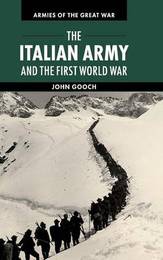
|
The Italian Army and the First World War
Hardback
Main Details
| Title |
The Italian Army and the First World War
|
| Authors and Contributors |
By (author) John Gooch
|
| Series | Armies of the Great War |
|---|
| Physical Properties |
| Format:Hardback | | Pages:402 | | Dimensions(mm): Height 229,Width 155 |
|
| Category/Genre | First world war |
|---|
| ISBN/Barcode |
9780521193078
|
| Classifications | Dewey:940.40945 |
|---|
| Audience | | Professional & Vocational | | General | |
|---|
| Illustrations |
6 Maps; 17 Halftones, unspecified
|
|
Publishing Details |
| Publisher |
Cambridge University Press
|
| Imprint |
Cambridge University Press
|
| Publication Date |
19 June 2014 |
| Publication Country |
United Kingdom
|
Description
This is a major new account of the role and performance of the Italian army during the First World War. Drawing from original, archival research, it tells the story of the army's bitter three-year struggle in the mountains of Northern Italy, including the eleven bloody battles of the Isonzo, the near-catastrophic defeat at Caporetto in 1917 and the successful, but still controversial defeat of the Austro-Hungarian army at Vittorio Veneto on the eve of the Armistice. Setting military events within a broader context, the book explores pre-war Italian military culture and the interactions between domestic politics, economics and society. In a unique study of an unjustly neglected facet of the war, John Gooch illustrates how General Luigi Cadorna, a brutal disciplinarian, drove the army to the edge of collapse, and how his successor, general Armando Diaz, rebuilt it and led the Italians to their greatest victory in modern times.
Author Biography
John Gooch is Emeritus Professor of International History, University of Leeds, and Honorary Professor of History, University of Kent. As well as serving at the Universities of Lancaster (1969-92) and Leeds (1992-2010), he has held appointments as Secretary of the Navy Senior Research Fellow at the United States Naval War College and Visiting Professor of Military and Naval History at Yale University. He was the founding Chairman of the Army Records Society and served as Joint Editor of the Journal of Strategic Studies for twenty-five years. In 2011 he was appointed Cavaliere dell'Ordine della Stella della Solidarieta' Italiana for services to Italian military history.
Reviews'This is the book which we have been waiting for ... a proper history of the Italian army in the First World War. Written by a scholar who knows the archives, but in English for those who don't, it will be the standard work for the foreseeable future.' Hew Strachan, University of Oxford 'An outstanding work of military history: highly impressive in the range of the sources that it uses, and exemplary in its judicious approach to the strengths and weakness of the army's performance in the First World War and to the merits and demerits of country's political and military leaders.' Christopher Duggan, University of Reading 'How Italy fought the First World War is a little-known but deeply tragic tale of political mismanagement, military malpractice and doomed valour, told by John Gooch with characteristic skill and erudition.' Macgregor Knox, London School of Economics and Political Science '[This volume], in the outstanding new Cambridge series Armies of the Great War, is a good read for anyone interested in the Great War, and particularly the 'forgotten' theatres, as well as ... students of the Italian army.' A. A. Nofi, The NYMAS Review 'Provides a sober and scholarly analysis of the Italian war which may counter many of the current anniversary outpourings with their fixation on the Western Front ... unquestionably the fullest account of how Liberal Italy fought its war - a desperate struggle which, it is always worth remembering, provoked at least 50 per cent more deaths than did the Nazi-Fascist conflict of 1940-45.' R. J. B. Bosworth, The English Historical Review 'Gooch synthesizes a vast range of material with concision, ranging from the causes and origins of Italian intervention into the war through to its social and political legacies, though the strongest sections are those on the war years themselves, where the analysis relies on extensive original research in the archives of the historical office of the Italian General Staff.' Vanda Wilcox, War in History
|